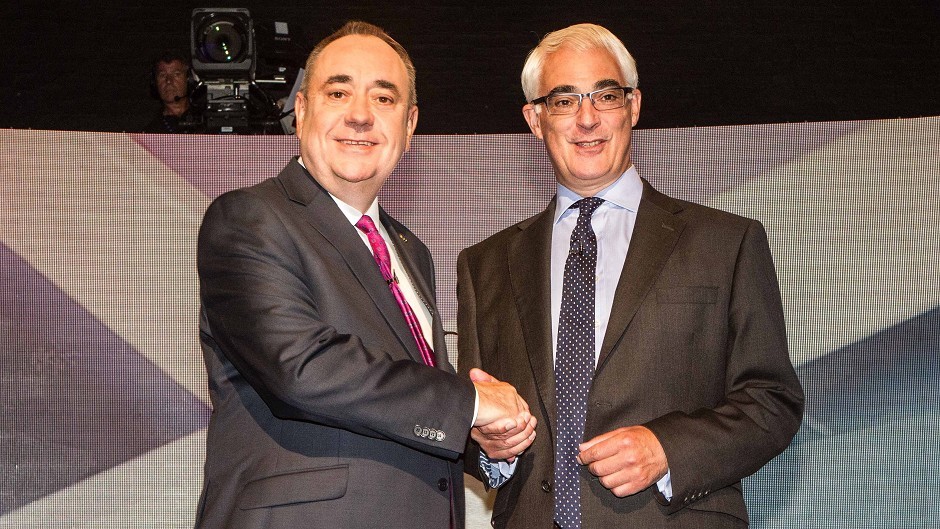First Minister Alex Salmond was left disappointed last night as he failed to dominate the first major independence TV debate in the way many expected.
Better Together leader Alistair Darling did not heed calls for him to adopt a strategy of “boring for Britain”, as he went on the attack and landed a number of blows.
Both sides claimed victory last night and commentators were divided on the outcome of the debate.
But many on social media claimed a narrow victory for the former Labour chancellor.
One snap poll of around 500 people found 56% said Mr Darling won and 44% said Mr Salmond was victorious.
The finding was very similar to national polls on the numbers of No and Yes supporters in Scotland.
However, Mr Salmond’s failure to make a major breakthrough represented a blow to the Yes campaign, as it needs to overhaul the poll gap in the last six weeks before the referendum.
The debate got off to a bad start for the host broadcaster STV as scores of commentators in England complained online about its live stream crashing.
Mr Darling struggled at first as well, stumbling when asked to name the new powers that Holyrood would get after a No vote.
However, in cross-examination, Mr Darling focussed on the currency issue and had the first minister on the ropes as he failed to answer what his “plan B” would be if the rest of the UK rejected a sterling union.
Mr Salmond fought back, quoting Mr Darling’s own words saying that a currency union was “logical”, although the No campaign leader disputed the context of the comment.
The SNP leader’s questioning centred on the “project fear” scare tactics of the No campaign, highlighting claims that Scots would have to drive on the right-hand side of the road and be vulnerable to attacks from outer space.
Audience members laughed as Mr Darling denied using scare tactics.
Mr Salmond also scored points as Mr Darling evaded repeated questions on whether Scotland could become a successful independent country.
In his final words, the first minister said “no-one will ever govern Scotland better than the people who love and work in Scotland”.
“This is our opportunity, let’s take it,” he added.
After the debate, Yes Scotland Chief Executive Blair Jenkins said: “This was a clear win for the Yes campaign – a positive, optimistic and visionary case presented by the first minister against another dose of negativity and scaremongering from Mr Darling.
“What Mr Darling presented was the No campaign’s bankrupt vision for the future of Scotland.
“He not only failed to make a positive case for a No vote – he didn’t even try.”
Better Together Campaign Director Blair McDougall said: “Tonight’s debate will prove to be a huge, possibly decisive, moment in the referendum campaign.
“Alistair Darling asked the questions Scotland needed answers to. The first minister’s failure to offer basic answers was there for all to see. Even the audience was turning against him as time went on.
“Alistair gave a strong performance but what matters more is that we believe his case will prove more persuasive with the remaining undecided voters
On social media, Labour’s Douglas Alexander said: “Alex Salmond thought this debate would be his Bannockburn…it’s turning out to be his Waterloo.”
Pro-independence Green MSP Patrick Harvie said: “This isn’t about Salmond or Darling. It’s about the people’s vote.”
